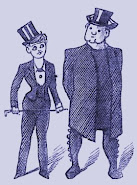Penny-a-Liners Phrase-Book, from the North Wales Chronicle 14 July 1846.
Penny-a-liners are a class of people so called because they are paid three-halfpence a line for what they write. Their meals are Accidents, their board and lodging Offences, and their clothes are generally got out of a Fire. These gentlemen have a phraseology exclusively their own. The terms most in use are printed in the following Phrase Book, for the use of persons who use newspapers and are puzzled sometimes to understand them :-
Devouring Element means Fire; as “The devouring element, now lashing the monument as if in anger, now running round it as if in sport soon razed it to the ground.” However, the “devouring element” is not applied to the fire, coal, or coke, or slate, or brick, which burns in the grate. Penny-a-liners do not say, “The leg of mutton was roasted in no time, by the scorching intensity of the devouring element of the kitchen.”
Electric Fluid is another word for Lightning; as, speaking of the fig-tree in a fig-tree court, a penny-a-liner would say, “The electric fluid struck the ill-fated tree on its topmost branch, and running down it with unusual celerity, leveled it with its mother earth.”
More easily conceived than described.-- There is an elegant termination to a difficult sentence, common to novelists and their unhappy brothers, Penny-a-liners.
Speaking of a gentleman who had been eating two shillings-worth of pastry, and could not pay for them because his pocket had been picked, it is usual to say, “When Mr. Alfred Spooney put his hand in his pocket, and, diving into its recesses, found he had not a penny, his feelings can be more easily conceived than described.” The last phrase, it will be seen, though rather lengthy, saves a great deal of embarrassing description.
A Monster in the Human Form.- This monster is generally a boy who has broken a window, or given a ran-away knock. Any little event is sure to be fathered on a “monster.” If a poodle is stolen it is the work of a “monster.” We recollect that Jones, when he was discovered in the Queen’s palace, was described as a “monster in the human form.” A Police-office is a great mart for “monsters,” and Newgate invariably contains one. “Monsters” abounded most at the time the Royal Exchange and House of Parliament were burnt down. A “monster” was supposed to be running about England “in the human form” burning everything.* The term, in fact, is always used when the author of an accident has not been discovered. We will be bound that, if the Thames is ever set on fire, it will be described as being the work of some “Monster in the Human Form.”
A Miscreant differs very little from the “monsters.” Perhaps he is a shade worse: for instance anybody who strikes a policeman is merely “a monster,” but if he strikes a woman he is a “miscreant.” A man is only a “monster” when he deserts his wife, but if he leaves three children chargeable on the parish, or takes away with him the key of the tea-caddy, then he is nothing but a “miscreant.”
Vital Spark is renewed as often as there is an accident. In the report of a murder there is always a “vital spark” brought in. If the “History of England” were to be written by a penny-a-liner, he would describe all the accidents and murders in the regular reporters’ terminology.
“The body of Rufus was found, at two P.M. in the depths of the forest, when a medical man was immediately sent for. The restoratives usual in such cases were speedily applied, but it was found that the vital spark had fled. The King is said to have fallen by the hand of some monster in the human form.”
“The body of Rufus was found, at two P.M. in the depths of the forest, when a medical man was immediately sent for. The restoratives usual in such cases were speedily applied, but it was found that the vital spark had fled. The King is said to have fallen by the hand of some monster in the human form.”
Launched into Eternity is a favourite expression that is always coupled with an execution. It means that a person was hung. The term is only applied to human beings. We do not remember an instance of a butcher ever being described, by a penny-a-liner, as launching a pig into eternity. -- Almanac of the Month.
*This is a reference to that “monster in the human form” Spring-Heeled Jack, who was said to be attacking women throughout London and its suburbs, at the time the Royal Exchange burnt down on 10 Jan 1838. The image of Spring Heeled Jack at top is from the Illustrated Police News, 28 December 1872.














A most enjoyable post. There is a breezy contemporary feel to this article that makes it hard to believe it was written in 1846. Most of the cliches described here outlasted the penny-a-liners..."launch into eternity" was big for the penny-a-worders in the pulp era, too.
ReplyDeleteStrange that a "miscreant" was more horrible than a "monster in human form." I always understood a miscreant to be a rather low-level perpetrator...a graffiti artist, perhaps. Certainly not someone who deserved to lose their vital spark by being launched into eternity.
Also noteworthy is the reference to "setting the Thames on fire," which was used well into the eighties. In France it was known as "setting the Seine on fire."
ReplyDelete